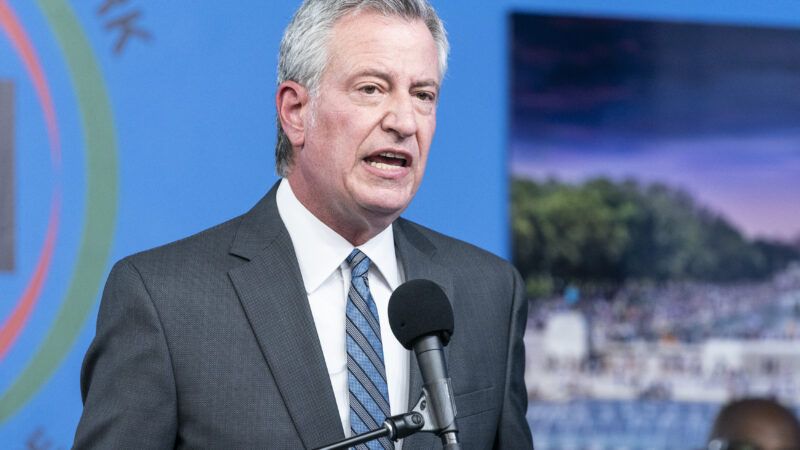Charter-Hating Democrats Now Relying on Charter Schools To Service Families Reluctant To Go Back Into School Buildings
The one-size-fits-all approach to monopolistic K-12 instruction continues to repel even as COVID-19 recedes.

On Monday, New York City Mayor Bill de Blasio followed the lead of states like New Jersey in announcing that public schools beginning in fall 2021 will no longer offer remote learning, and that teachers will no longer be granted COVID-19 medical waivers. No more hybrid, no more hair-trigger shutdowns, no more "Zoom in a room"—staff and students alike are expected to be inside school buildings five days a week.
This move in the nation's largest school district, along with others like it around the country, comes as a tremendous relief to millions of parents who have been desperate for a predictable schedule these past 14 months while watching their kids suffer through learning loss and mental/emotional challenges. Even though details such as masking and distancing have yet to be solidified, taking the remote option off the table serves as a crowbar to force open school doors in a system where three out of five kids are still attending class from afar.
And as in all such uses of force, some people are less than thrilled about having their options curtailed.
"How could the city essentially force us back, force us to make a choice that is not acceptable to us?" Brooklyn mom Tazin Azad told The New York Times. Manhattan parent-of-five Lilah Mejia complained to Chalkbeat that, "De Blasio does not make the final say about what's safe for me and my family….I am now thinking I need to possibly look at homeschooling options."
For much of the pandemic, the school-choice analysis of how families would respond to the pace of reopening has mostly centered on parents like, well, me: comparatively affluent, pale in hue, unshy about advocating their educational preferences.
"As white parents increasingly insist on in-person school, leading them to enroll in private options or move to the suburbs, at the same time that many parents of color are reluctant to send their children back in person, it's exacerbating the inequities that already plague urban public school systems," wrote Lauren Camera for U.S. News & World Report this month, in a piece with the unsubtle headline "Angry White Parents vs. the Public School System."
But the new developments flip that script. Now it is poorer families, in black and Latino communities, who are grasping for school options that better fit their desires. And what they can't help but notice, particularly in the heavily Democratic, union-influenced cities where schools are most likely to be less than fully open, is that the local educational and political establishments have been systematically choking off what choices they have.
New York City parents who want their kids to learn remotely this fall now have three lanes: homeschooling, private instruction, or charter schools. But that latter option has been deliberately limited by teachers unions and their Democratic allies, who have successfully enforced a charter cap at the state level despite parents being overwhelmingly in favor of lifting it. De Blasio, during his calamitous run for president, declared that he "hate[d]" the charter schools that educate more than 10 percent of kids receiving a public education in his city.
(Fortunately, the three leading candidates to replace de Blasio, Andrew Yang, Kathryn Garcia, and Eric Adams, have all advocated increasing the number of charter schools.)
The Democratic Party, which receives 94 percent of teachers union political contributions, has devolved in recent years from charter-curiosity to charter-hostility, with once-supportive politicians like Sen. Cory Booker (D–N.J.) understanding that the price of national political ambition is to suppress what is now considered heresy. But this stance may put pols in a pickle as charters get deployed by otherwise remote-canceling districts as the safety valve for parents unwilling to send their kids into school buildings.
As J.D. Tuccille wrote in these pages last month, "Among the victims of the COVID-19 pandemic we can probably count Americans' faith in government-dominated education." The pandemic has exposed deep structural flaws in the monopolistic provision of K-12 instruction—the student-damaging political influence of teachers unions, the monomaniac focus on "systemic racism," the fundamentally alienating one-size-fits-all approach. It's no wonder that homeschooling has tripled, school choice laws are proliferating, and preliminary fall enrollment figures continue to plummet.
Government-run schools are awash in unprecedented amounts of federal dollars right when the public is turning away from them. This is the ideal moment to rethink the top-down model, acknowledge that one size just cannot ever hope to fit all, and allow whatever taxpayer dollars that are being spent on education to be directed by families exercising their choice, rather than by bureaucrats trying to close choice down.


Show Comments (60)